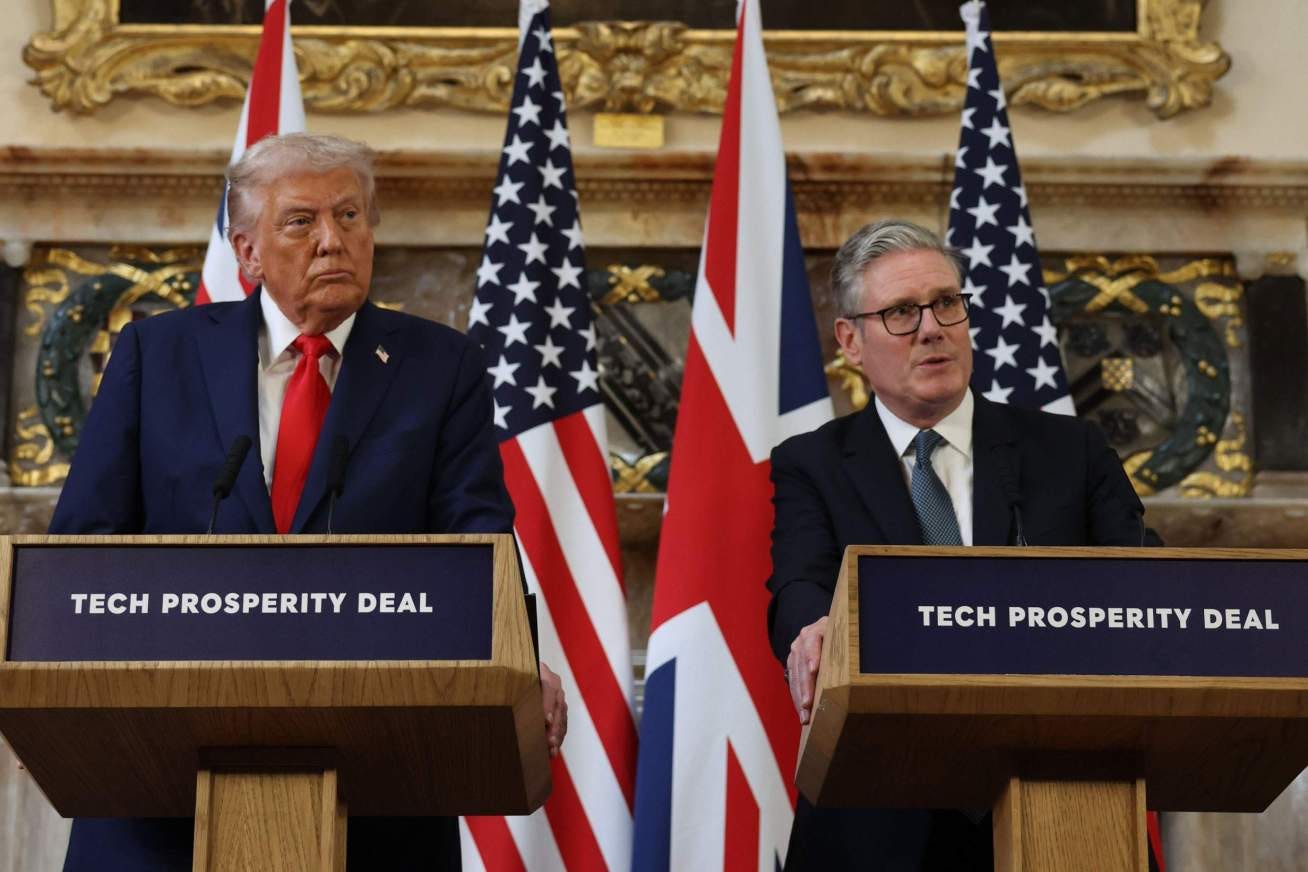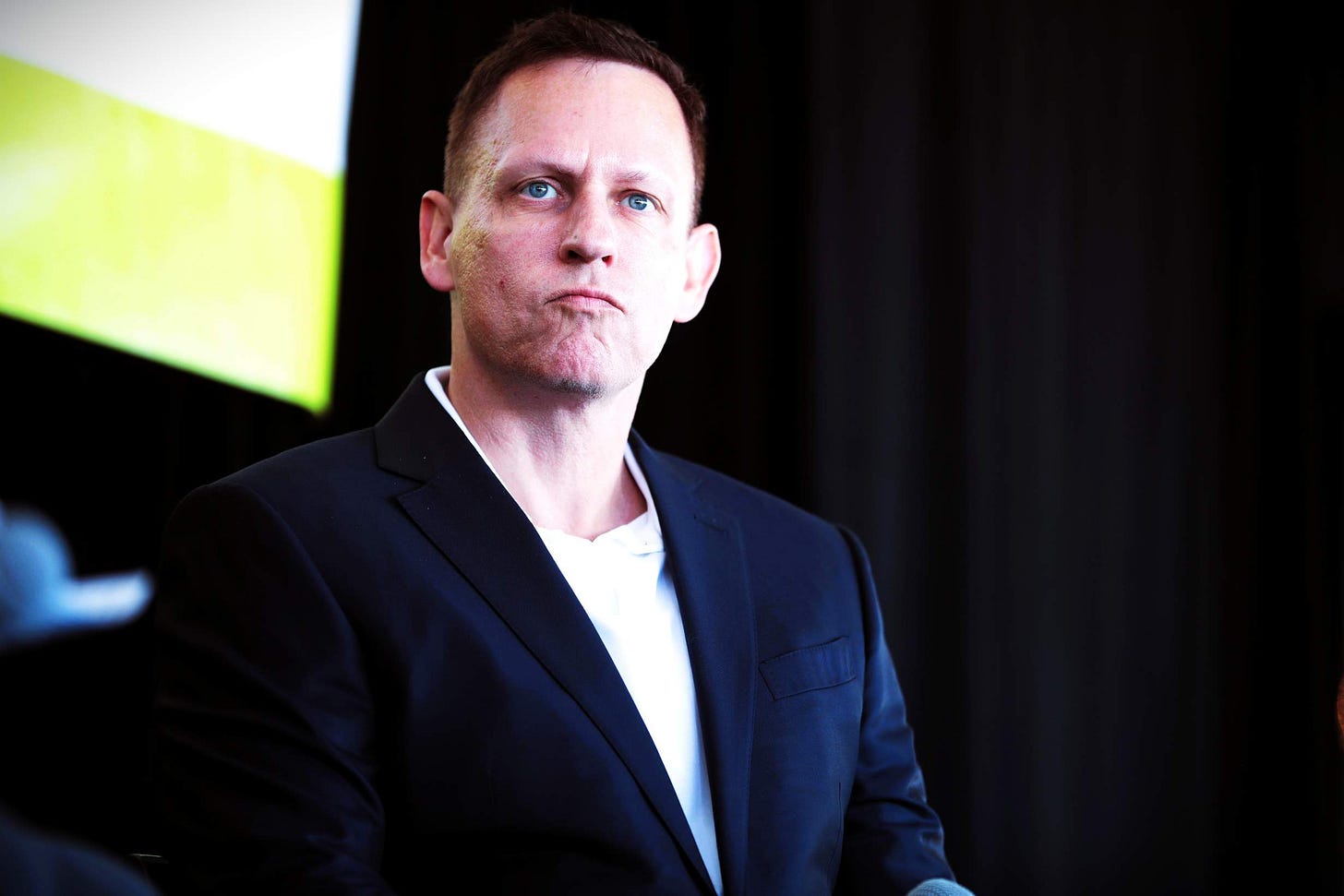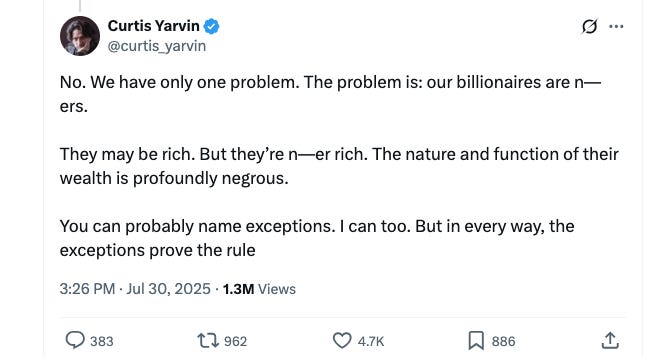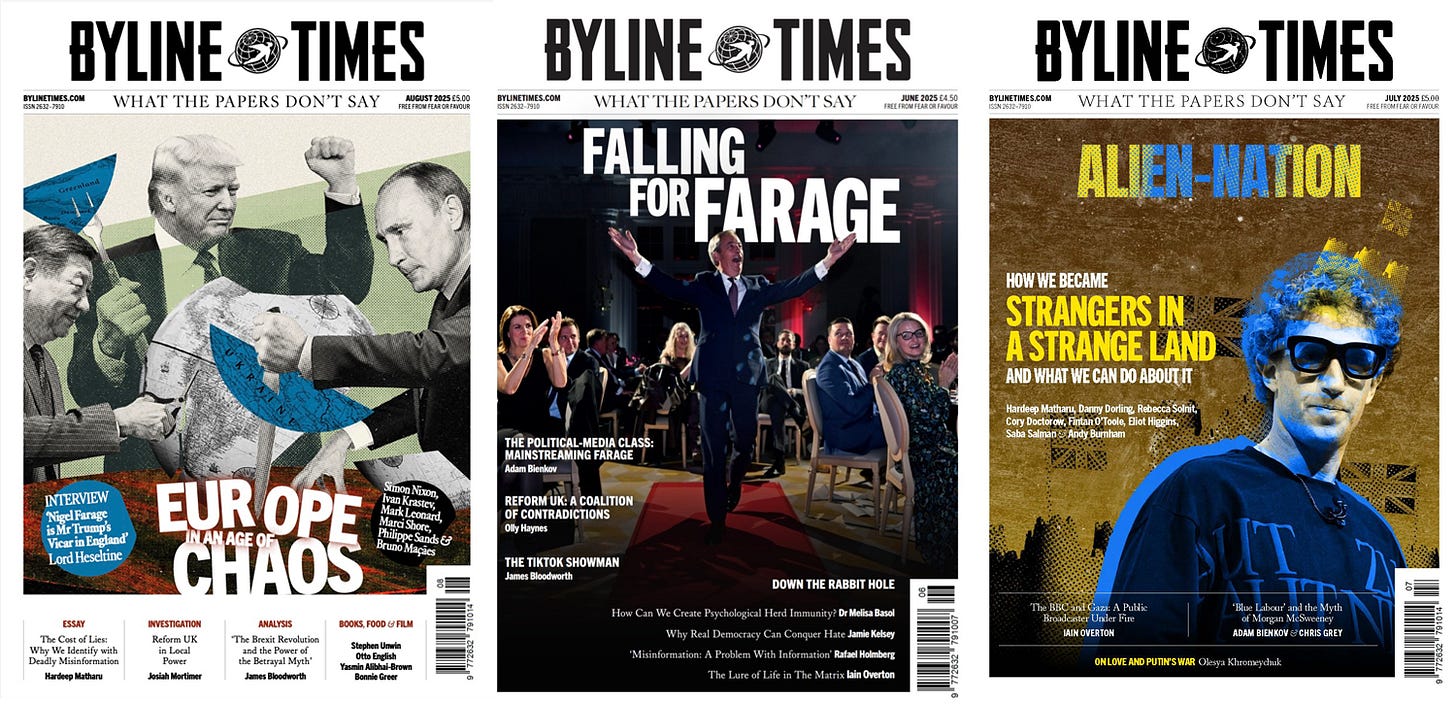‘Blue Labour’ and the Thiel Effect: How MAGA Is Making In-Roads Into British Politics
The ideology of the ‘Make America Great Again’ movement, which has transformed politics in the United States, is having an impact in the UK. But how is this influence being transmitted?
‘Making Friends with MAGA’
Lord Maurice Glasman likes to visit what he calls a ‘bike shed’ round the back of the upper chamber where he sits smoking roll-ups and shooting the political breeze.
With his East End accent and affable manner, he is happy to engage. Ordering burgers and chips in the House of Lords canteen, he seems to know all the staff by name, whom he treats like peers rather than peers of the realm.
And so Lord Glasman may – or may not – appear to be an unusual candidate to enter the eye of the storm since Donald Trump’s re-election in the United States.
Recently referred to as Number 10’s “MAGA whisperer” by The Times, he was the only British lawmaker invited to Trump’s second presidential inauguration, on a freezing January day in Washington, DC, earlier this year.
Glasman was invited there by a long-term contact – now the US Vice President – JD Vance, who admired his writing about class and had first approached him some years earlier, exploring whether the US Democrats could provide a new deal for workers. In DC, Glasman was overawed by the scale of the celebrations and the energy around Trump’s ‘Make America Great Again’ movement.
He sought out, and was sought after, by some of the most important Trumpworld movers and shakers: Steve Bannon, former Trump campaign manager and co-founder of Cambridge Analytica; the influential ‘Dark Enlightenment’ thinker Curtis Yarvin, and – as Byline Times can reveal – the tech baron and Palantir data firm founder, Peter Thiel.
This would be an impressive list of American contacts to make in less than a year, but more unusual still – given Trump’s well-known connections with Reform UK Leader Nigel Farage (who Glasman regularly debates on GB News) or the long-established links between the US Republican Party and the British Conservatives – is that Lord Glasman has been a left-wing Labour peer for 14 years.
As a founder of the ‘Blue Labour’ strategy – which promotes the blue-collar union origins of the Labour movement – Glasman has often swum against the New Labour mainstream.
An early critic of globalisation, he dislikes the term ‘diversity’ and rails against the way what he calls ‘progressivism’ has replaced working-class ‘solidarity’ with rules and regulations.
Glasman voted and campaigned to leave the EU in 2016, and decries the ‘lanyard class’ of politicos and wonks. Though he believes in the rule of law, he condemns ‘the rule of lawyers’.
He worked with Keir Starmer’s Chief of Staff, Morgan McSweeney, to see off the threat of the far-right BNP in east London in the Noughties – but does not appear concerned that a new far-right, centred around revived race science and Big Tech, could be using him to add an air of respectability around their access to the governing Labour Party.
Previous reports have detailed Glasman’s appearance at Trump’s second inauguration, having his portrait painted alongside Curtis Yarvin, and his appearances on Steve Bannon’s War Room podcast. But, for the first time, Byline Times can reveal that he was tasked by Morgan McSweeney to make contacts and connections in the Trump administration. And, at first, he reported back almost daily to Number 10.
This newspaper can also reveal that, at the inauguration, Glasman met Peter Thiel – whose company, Palantir, was recently awarded a £1.5 billion contract with the Ministry of Defence as part of the US-UK ‘Tech Prosperity Deal’ announced by Donald Trump and Prime Minister at the recent state visit.
Glasman shared a cup of tea with Thiel while talking about AI, an area he has an avid interest in.

‘Bloody Big AI Everything’
Peter Thiel is no ordinary tech billionaire.
One of the founders, along with X owner Elon Musk, of the payment system PayPal, he has become one of the most powerful Silicon Valley venture capitalists who have supported and benefited from Trump’s administration.
After becoming an early backer of Facebook and a founder of the data mining company, Palantir, Thiel soon made his way into media and politics.
He funded a legal case by wrestler Hulk Hogan, which ended up destroying the once successful Gawker media site. Thiel also contributed to superpacs supporting Trump in 2016 after several Palantir staffers – including at least one senior employee – informally worked on Steve Bannon’s now-defunct digital campaigning firm Cambridge Analytica.
When Trump entered the White House in 2017, Thiel appeared to be leaving politics. But he still had a hand in the media. As his biographer Max Chafkin revealed in Contrarian: Peter Thiel and Silicon Valley’s Pursuit of Power, Thiel secretly seed-funded Quillette – the Australian magazine that has specialised in giving race science a new gloss.
Meanwhile, Palantir expanded its operation with numerous US government agencies supplying AI-driven systems for its ‘lawfare’ against opponents, and embedding itself in core government functions, from the Pentagon to ICE deportations.
Palantir’s London office started growing, too. Within weeks of Boris Johnson becoming Prime Minister in August 2019, he held a private, unminuted meeting with him and his chief advisor Dominic Cummings – later exposed in leaked documents.
Within months, Palantir was running the Government’s COVID data platform. By 2023, it had secured a seven-year contract to run the NHS’ new Federated Data Platform worth between £330 million and £480 million, depending on extensions. Campaigners at Foxglove described it as “the largest NHS data deal ever signed”.
Come 2024, and Donald Trump’s second bid for the White House, Thiel was back as his most powerful backer, mainly through his funding and backing of JD Vance, who became (to the surprise of many) Trump’s nominee for Vice President in June 2024. The ‘Tech Bros’ had made their choice.
Trump’s triumphant return at the election that year made Thiel the most powerful ‘broligarch’ figure in the ‘MAGA’ bloc, outstripping his fellow-born South African Elon Musk (who soon fell out with Trump), and the late converts such as Facebook’s Mark Zuckerberg and Amazon’s Jeff Bezos.
Thiel’s allies now permeate Trump’s inner circle.
His protégé, JD Vance, provides a direct channel from the Oval Office. Thiel associate Jim O’Neill was installed as acting head of the Centres for Disease Control and Prevention despite his lack of medical expertise.
If his business and social connections to the second Trump administration were not enough, Thiel is already on the record as one of the most vocal critics of democracy, having avowed in 2009 that “I no longer believe that freedom and democracy are compatible”.
A devout Christian, Thiel more recently appears to believe that the world is about to face an apocalyptic moment – touring various universities with his ‘anti-christ’ lectures (he wonders if climate activist Greta Thunberg might fit that category), including in the UK, where, as Byline Times can reveal, his influence and funding extend.
On the business side, the recent state visit by Trump to the UK sealed the deal for Palantir. A new strategic partnership announced by the Ministry of Defence will see Palantir invest up to £1.5 billion into UK defence AI innovation, establish its European headquarters in the country, and help build cutting-edge military decision-support tools, including blending surveillance with automation for the ‘kill chain’.
So what did the founder of Blue Labour make of the chief broligarch and his influence?
Maurice Glasman told Byline Times that his discussion with Thiel was mainly about how to stop Big Tech from driving more unemployment for blue-collar workers. “I believe in bloody big AI everything,” he said, “for the whole national system, draped with a Union Jack.”
It was this joint fascination with AI, according to Glasman, that led him into the company of one of Thiel and Vance’s favourite thinkers, Curtis Yarvin, previously known as Silicon Valley blogger ‘Mencius Moldbug’.
Painting a Portrait
If Palantir represents the ‘hard power’ of Peter Thiel’s interests, Curtis Yarvin appears to be an avatar for a more ideological soft power network – which arguably attempts to launder discredited race science into the mainstream under the guise of contrarian ‘post-liberal’ debate.
Under his pseudonym Mencius Moldbug, Yarvin devised the “Dark Enlightenment” – a blueprint for dismantling democracy and national borders, and replacing them with a “patchwork” of thousands of corporate monarchies each governed by a “joint-stock corporation” which operates “without regard to the residents’ opinions”.
His writings are littered with the use of racial slurs and claims that “negroes” are “naturally inferior to the whites” due to genetic “neurological” differences.
Glasman met Thiel’s ‘court philosopher’ when Yarvin travelled to London for the February 2025 Alliance for Responsible Citizenship (ARC) summit, trailed by documentary film-makers. The pair spoke about their mutual fascination with John Ruskin (Glasman is a regular speaker at Ruskin College, Oxford), who inveighed against the effect of industrialisation on the aesthetic connection between the worker and their work.
They discussed William Morris and the Arts and Crafts rebellion against mechanical reproduction in a flat in Cable Street where Yarvin was staying, while an artist who happened to be present started an oil painting of the pair.
According to the New Yorker, during this meeting, Yarvin showed Glasman how he had manipulated an AI chatbot into repeating the N-word.
Asked by Byline Times how he reacted when Yarvin used the slur, Glasman said he replied “eugh!” and left shortly afterwards – though he finished the painting, of which he has a photo on his phone.
“I didn’t storm out or anything like that,” he said. “Obviously, I disagree with such language and the views behind it. Yarvin wants to be a rock star but doesn’t do his homework. I think he’s a wanker.”
“Wanker” or not – a term that sounds over-familiar and informal given the context – Glasman’s willingness to engage with Yarvin around their shared interest in AI is indicative of how those with race science beliefs are being normalised, unwittingly or not, in elite company.
Glasman has known Yarvin since before Trump’s second term and said he remains interested in his views on AI – and would continue to engage with him on the subject.
Yarvin returned to London in June, when he reportedly met Glasman again. At a garden party on 23 June, he told Financial Times journalist Jemima Kelly that “last night he was hanging out with Lord Maurice Glasman” whom he called “a charming fellow”.
Glasman disputes the account, saying “he wanted to meet, but I couldn’t make it. I spoke to him on the phone, but didn’t fancy meeting”.
Since he met Glasman, Yarvin has continued to express his views on race.
In a now-deleted tweet from July this year, preserved in the archives, he wrote:
Despite this, Yarvin spoke on panels at the How the Light Gets in Festival in London in September hosted by the Institute of Art and Ideas.
Glasman does not ‘look up’ the people he meets in advance, preferring to take individuals as he encounters them.
But, had he done so, he would have seen that Yarvin’s politics are inseparable from the so-called “human biodiversity” movement – a rebranded form of eugenicist thought, rooted in research funded by the Nazi-aligned Pioneer Fund.
Another of Yarvin’s supporters is Steve Bannon, who also befriended Glasman at Trump’s inauguration.
Beyond appearing on Bannon’s War Room podcast, the Labour Lord said he spoke to the former Trump campaign chief for several months after the inauguration. Asked about Bannon’s extreme views – such as his views on Islam; his support for the AfD in Germany; and his claim during a far-right rally in France in 2018 that the crowd should “wear” accusations of racism, nativism, and xenophobia “as a badge of honour” – Glasman distanced himself from such rhetoric.
“As the son of immigrants myself, I of course hate and disagree with these ideas,” he said. “But if we are to hold them off in Britain, we need a Blue Labour movement based on nationalist industrial revival.”
Glasman was emphatic that he did not share Bannon or Yarvin’s views on issues of race, but believes Bannon to be one of the greatest politicians of our age for his attempts to build a nationalist working-class movement against mass immigration and globalisation.
Alliance of Strangers
With his Jewish heritage and long history of fighting the far-right, it is interesting that Maurice Glasman overlooks the unfortunate historic combinations of ‘nationalist’ and ‘socialist’, and the worrying affiliations of his new American friends.
He is not alone in that. It is something Glasman shares with one of the key architects of New Labour: Peter Mandelson.
Mandelson, too, was a Labour contact for Thiel. Both he and Thiel were close to the disgraced financier and serial child sex offender Jeffrey Epstein. Epstein was connected to Thiel through their co-investments in Valar Ventures, the value of which, at $170 million, makes them the Epstein estate’s largest asset. Mandelson’s lobbying company, Global Counsel, advised Palantir during the procurement process.
In February, the Prime Minister visited Palantir’s headquarters in Washington DC with its CEO Alex Karp – a visit that was arranged by the British Embassy in Washington, when Mandelson was still the UK’s US Ambassador.
It is understood that Glasman previously warned the UK Government not to appoint Mandelson as Ambassador due to his Epstein connection. He was sacked from the role by Keir Starmer over revelations about Mandelson’s support for Epstein despite being convicted in 2008.
However, the Labour Government might hear the voice of Peter Thiel through other conduits that Glasman is connected to.
Glasman met Yarvin through the Alliance for Responsible Citizenship (ARC) – a London conference co-founded by Canadian psychologist and author Jordan Peterson, and bankrolled by GB News investor Sir Paul Marshall, who also owns the UnHerd site and the Spectator magazine. Glasman sits on ARC’s advisory board alongside right-wing thinkers Peterson and Douglas Murray, the Spectator’s Associate Editor.
ARC’s advisory board also consists of pro-Trump Republican Congressman Mike Johnson, Speaker of the US House of Representatives and Leader of its Republican majority; and Senator Mike Lee, chair of the powerful Energy and Natural Resources Committee. Thiel himself joined the ARC summit via livestream in conversation with Jordan Peterson.
Another Thiel protégée is also on the ARC board: James Orr. As head of Reform UK’s policy think tank, the Centre for a Better Britain, Orr is known as JD Vance’s ‘British sherpa’ and plays a key role in shaping the party’s programme. He hosted Vance at his home during his London visit in August, and introduced him to Conservative Shadow Justice Secretary, and future Tory leadership hopeful, Robert Jenrick.
Orr is also part of what Cambridge University sources have referred to as a ‘Cambridge Thiel network’ – right-wing academics nurtured with support from Thiel Capital’s chief of staff Charles Vaughan, who has made repeated visits to the campus. Orr invited Charles Murray, author of The Bell Curve, to an online seminar for Cambridge and Oxford in 2021. The Southern Poverty Law Centre designates Charles Murray a white nationalist extremist for his claims about race, IQ, and genetics.
Fellow ARC advisors Douglas Murray and Jordan Peterson were involved, too, with Orr pushing for Peterson to speak at Cambridge as a visiting fellow. Peterson has endorsed The Bell Curve’s idea of “cognitive stratification”, while Murray has lamented that “almost nobody wanted to go over the evidence” that IQ varies with ethnicity.
ARC did not reply to Byline Times’ request for comment.
Asked about his fellow ARC advisors, Glasman told Byline Times: “I have nothing to do with any of them. Jordan Peterson is crap. The reason I sit on the ARC advisory board is purely due to my interest in supporting the role of faith in public life.”
Papers and Proposals
Maurice Glasman’s own role in the ‘lanyard class’ arguably includes his initial billing, alongside former Labour MP John Cruddas, as leading the Policy Exchange think tank’s ‘Future of the Left’ programme.
Policy Exchange has been central to Conservative policy-making, and this new initiative is designed to influence Labour thinking by sending papers and proposals directly to Number 10.
The director of the programme, academic Jonathan Rutherford, told Byline Times that neither Glasman nor Cruddas are now operationally involved. But he has praised another organisation which Glasman is involved with as a board member – Civic Future, a leadership pipeline founded by Boris Johnson’s former Number 10 policy chief, Munira Mirza.
One of Civic Future’s sponsors is Emergent Ventures, a fellowship and grant programme at George Mason University’s Mercatus Centre, which was launched in 2018 with $1 million from the Thiel Foundation. Its director, Tyler Cowen – a long-time Thiel ally who has called him “one of the greatest public intellectuals of our time” – also sits on Civic Future’s board alongside Glasman.
Civic Future’s British backers are drawn from some of the Conservatives’ most powerful donors – including Lord Michael Spencer, Lord Nash, Lord Agnew, and Wol Kolade. Alongside them is Lord Bamford, whose money has not only financed the Conservative Party but also Nigel Farage’s Reform UK.
A recent investigation by anti-extremism organisation Hope Not Hate revealed that former government advisor Andrew Sabisky has been advising Civic Future. Brought into Number 10 as a senior advisor by Dominic Cummings in 2020, he resigned soon after it emerged that he had argued that black people are genetically predisposed to lower IQ and suggested compulsory contraception to reduce Britain’s “underclass”.
Civic Future’s programme director, Jack Hutchison, is part of Sabisky’s ‘Sabs Central’ network of Conservative policy thinkers. He said he wanted Sabisky’s reputation “rehabilitated” and that Sabisky had been “influential” in Civic Future’s founding, with several of his recommended candidates joining it.
Glasman told Byline Times he knew nothing about Sabisky’s role in Civic Future. When he had asked Mirza Munira about the allegations, she claimed to be unaware.
Civic Future and Policy Exchange did not respond to requests for comment.
Farage and the Far-Right
While Lord Maurice Glasman’s tolerance and friendliness are commendable, it is reasonable to suggest that his attitude to the right-wing he spent his life combating appears concerning.
His verdict on both Labour and the Conservatives is bleak: on their current course, Reform UK would eclipse them.
Glasman talks regularly with Nigel Farage, a fellow GB News speaker, whom he ranks with Bannon as one of the most influential political movers in this era.
With this belief that the Labour Party under Keir Starmer is in the same state of terminal decline as the Conservative Party, Glasman believes that Farage – who distances himself from the likes of far-right convicted criminal Stephen Yaxley-Lennon (‘Tommy Robinson’) – is providing a backstop to the far-right in the UK.
Dismissing the characterisation of him as “MAGA whisperer” by the British press, Glasman acknowledges the danger the country faces – believing that British politics has to adapt before being overrun.
“The rise of this nationalist movement of the working-class is inevitable,” he told Byline Times. “It’s up to us in Britain to push back to prevent being hijacked by these other disgusting ideas.”
Glasman discounts the risk that the conferences, colleges, and think tanks he attends could be used instrumentally. Nonetheless, the possibility remains that, rather than him gaining intelligence about MAGA, his new connections – Thiel, Yarvin, and Bannon joining his previous contact with Vance – may be using the association with him to normalise and channel far-right figures into the heart of British politics.
Donald Trump and his backers have shown that the most effective attacks on democracy do not necessarily come as coups or revolutions. They creep in through regulators, conferences, advisory boards, and procurement contracts. They look like openness, pragmatism, patriotism, and even common sense.
And often, it is not conspiracy or even strategy that brings individuals together but a convergence of shared interests, and a joint belief that liberal democracy and globalisation have failed. The forces that are beginning to replace it, driven by global tech monopolies and AI data extraction, lead back down the road to a new kind of serfdom.







I am constantly amazed at how easy it is for techbros to ‘snow’ politicians with whatever the latest shiny new thing promises - and almost never delivers. AI is but the latest example.
The bigger danger lies in the affinity with Thiel and his mates. What politicos completely miss is that the
techbros only care about the pursuit of power and winning. Everything else is secondary.
Even to the point where Larry Ellison famously cancelled his keynote speech at Oracle OpenWorld in 2013 in favour of watching his racing team win the Americas Cup in San Francisco. That equates to sticking two fingers up at the 60,000 attendees.
If you can do that and still end up the richest man in the world in 2025 then what does that say about power and wealth?
Excellent article, well researched and clearly joining the dots of the normalisation of extreme right ideologies and the role of foreign billionaires in funding “influencers” in the UK.